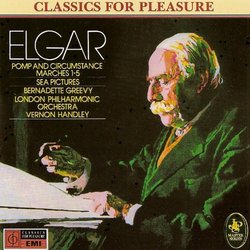| All Artists: Edward Elgar, Vernon Handley, London Philharmonic Orchestra, David Bell Title: Elgar: Pomp and Circumstance Marches 1-5; Sea Pictures Members Wishing: 0 Total Copies: 0 Label: Angel Records Release Date: 8/20/1993 Genres: Special Interest, Pop, Classical Styles: Marches, Vocal Pop Number of Discs: 1 SwapaCD Credits: 1 UPC: 077776200422 |
Search - Edward Elgar, Vernon Handley, London Philharmonic Orchestra :: Elgar: Pomp and Circumstance Marches 1-5; Sea Pictures
 | Edward Elgar, Vernon Handley, London Philharmonic Orchestra Elgar: Pomp and Circumstance Marches 1-5; Sea Pictures Genres: Special Interest, Pop, Classical
|
Larger Image |
CD Details |
CD ReviewsLESS IS MORE DAVID BRYSON | Glossop Derbyshire England | 03/01/2005 (4 out of 5 stars) "You will no doubt have heard the Pomp and Circumstance marches played with more pomp, not to say circumstance, than you will find here. It may also be that the name of the conductor, Vernon Handley, is not overly familiar to you. He has never achieved star status, but while I can't claim any enormous familiarity with his work I can say confidently that everything I've heard from him I have heard done less well on occasion by bigger names. In any case Elgar is too important a composer to be left to Boult, Barbirolli, Previn, Rattle and a few other giants - he needs to be seen and heard from various standpoints like any other great composer.
These performances are as fresh as paint. The readings are lively and pointed, the orchestral work is a model of precision and vivacity, Elgar's wonderful instrumentation comes across with a clarity that it doesn't always, (maybe not even often), and there is a blessed lightness about it all. Speeds are fairly brisk, certainly on the fast side for actual marching, but probably not much if at all faster than many other readings that seem slower simply because they let you hear less detail. I'll also gladly settle for some toning-down of the pomp where pomp in effect means pomposity. The trio section of the first march, to take the most obvious instance, was conceived as an instrumental tune for ordinary orchestral forces. The words `Land of Hope and Glory' sung by the entire Albert Hall were a later accretion. Elgar's many endowments don't seem to me to include great discrimination in the matter of poetry, I have to say. His Sea Pictures are obviously such refined and superior music that I have had to search my conscience for the reason why I can't consider them the equal of, say, Berlioz's Nuits d'Ete. I think it comes back to the poems. Not only are these five poems painfully dated in idiom (and for me Elizabeth Barratt Browning seems something not far off feeble-minded), they are simply not ABOUT very much. Bach, Handel, Mozart and Schubert time and again set poetry that was worse, purely as poetry, than this. However it always had a point of some other kind that kindled the fire inside them. They set the agenda and used the inferior material for purposes the poets never glimpsed. Elgar's deep and neurotic sensitivity has been influenced, as to some extent it was in Gerontius, to identify with visions far poorer than his own. In suggestion these songs resemble Berlioz's great orchestral song cycle far more than they resemble the Four Last Songs of Elgar's own great contemporary. The orchestral forces called for are large, but their deployment is sparing and selective, and the Sea Pictures have an intimate feel about them. Bernadette Greevy sings really superbly, with beautiful tone and gorgeous artistry in her phrasing. There are occasional touches of the kind of contralto tone now and again designated unkindly as `hooty', but that has to be taken as part of the style and it seems unimportant in so superior a rendition as this. Handley again seems to me to acquit himself extremely well, capturing the odd combination of fulsome and ethereal that was part of the composer's contradictory makeup, an aspect that comes to the fore in these songs. The recording, engineered by the redoubtable Mr Bear, has been handled with enormous skill and accomplishment. What stays me from giving the set a fifth star is simply that there is so little of it. Cost/value is a factor with me. This record has a lot going for it indeed in ways I've attempted to indicate. From my point of view quality is not in question. Quantity is a simpler matter of fact, and so is cost but of a more variable fact." |

 Track Listings (10) - Disc #1
Track Listings (10) - Disc #1